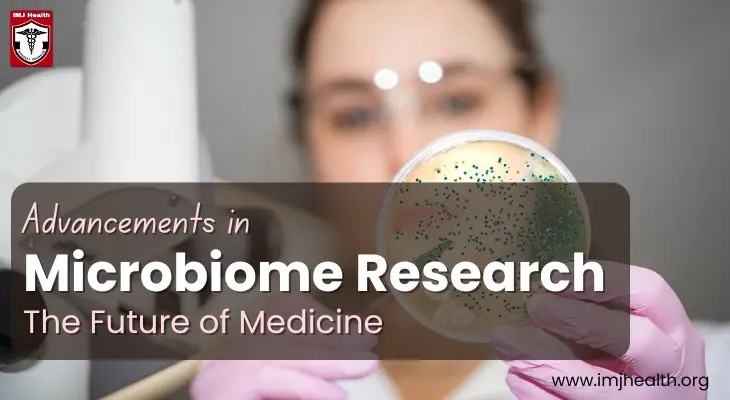Advancements in Microbiome Research: The Future of Medicine

Microbiome research is reshaping medicine by uncovering how gut bacteria impact immunity, digestion, and mental health. Scientists are developing new therapies, including probiotics, fecal transplants, and microbiome-targeted drugs, to treat chronic diseases. These breakthroughs offer hope for personalized medicine, improved treatments, and a deeper understanding of human health.
Advancements in Microbiome Research: The Future of Medicine
Microbiome research has become one of the most exciting fields in medicine. The human body is home to trillions of microorganisms, including bacteria, viruses, fungi, and other microbes, which form a unique ecosystem called the microbiome. These tiny organisms play a crucial role in digestion, immunity, mental health, and overall well-being. With advancements in microbiome research, scientists are discovering new ways to treat diseases, improve gut health, and even influence brain function.
What is the Microbiome?
The microbiome refers to the collection of all microbes living inside and on the human body. The most studied microbiome is in the gut, but other microbiomes exist on the skin, in the mouth, and even in the lungs. These microbes help digest food, fight harmful pathogens, and regulate immune responses.
Why Microbiome Research is Important
Scientists now understand that a healthy microbiome is essential for good health. Disruptions in the microbiome can lead to various diseases, including obesity, diabetes, inflammatory bowel disease (IBD), depression, and even cancer. Research is focused on finding ways to restore and maintain a balanced microbiome to prevent and treat diseases.
Key Advancements in Microbiome Research
1. Gut Microbiome and Disease Treatment
- Scientists are exploring how gut bacteria influence diseases like diabetes, autoimmune disorders, and heart disease.
- Studies have shown that certain bacterial strains can help regulate blood sugar and reduce inflammation.
- Researchers are developing probiotics and prebiotics to restore gut health in patients with digestive disorders.
2. Microbiome-Based Therapies
- Fecal Microbiota Transplantation (FMT): This treatment involves transferring healthy gut bacteria from one person to another to treat infections like Clostridium difficile (C. diff).
- Microbiome-Targeted Drugs: New medicines are being developed to modify gut bacteria and treat diseases such as cancer and IBD.
3. The Gut-Brain Connection
- The gut microbiome plays a crucial role in mental health, influencing conditions like anxiety, depression, and Alzheimer's disease.
- Scientists have found that certain gut bacteria produce neurotransmitters like serotonin and dopamine, which affect mood and behavior.
- Future treatments may include using probiotics and microbiome-based therapies to support mental well-being.
4. Microbiome and Immunity
- A strong microbiome helps the immune system recognize harmful invaders and fight infections.
- Research suggests that gut bacteria can enhance the effectiveness of vaccines.
- Scientists are studying how the microbiome influences autoimmune diseases like rheumatoid arthritis and multiple sclerosis.
5. Microbiome and Cancer Research
- Researchers have discovered that gut bacteria can affect how well cancer treatments, such as immunotherapy, work.
- Certain bacteria strains can boost the body's ability to fight tumors.
- Scientists are working on microbiome-based cancer treatments that could improve survival rates.
6. The Role of Diet in Microbiome Health
- A healthy diet rich in fiber, fruits, and fermented foods supports a diverse and beneficial microbiome.
- Western diets high in processed foods and sugar can harm gut bacteria and increase the risk of disease.
- Personalized nutrition based on microbiome testing is emerging as a new approach to improve overall health.
7. Advances in Microbiome Research Tools
- Scientists are using metagenomics (DNA sequencing technology) to study the microbiome in greater detail.
- Artificial intelligence (AI) and machine learning help analyze microbiome data and predict disease risks.
- Lab-grown microbiomes allow researchers to test new treatments without using human subjects.
Challenges in Microbiome Research
While the field of microbiome research is advancing rapidly, there are still challenges:
- Each person’s microbiome is unique, making it difficult to develop one-size-fits-all treatments.
- More research is needed to understand how microbiomes interact with genetics and lifestyle.
- Regulatory approval for microbiome-based therapies takes time.
The Future of Microbiome Research
The future of medicine will likely include microbiome-based treatments for a wide range of diseases. Potential developments include:
- Personalized medicine based on an individual's microbiome profile.
- Synthetic probiotics designed to deliver specific health benefits.
- Microbiome engineering to remove harmful bacteria and introduce beneficial microbes.
How IMJ Health Can Support Microbiome Research
IMJ Health provides a reliable platform for publishing high-quality microbiome research. Whether you are studying gut bacteria, microbiome-based therapies, or personalized nutrition, IMJ Health ensures your findings reach a global audience.
Why Publish with IMJ Health?
- Fast & Transparent Peer Review – Ensuring quick publication of your work.
- Global Reach – Your research is indexed in major databases.
- Open Access – Maximizing the impact of your discoveries.
- Expert Support – Guidance on manuscript preparation and ethical compliance.
By publishing with IMJ Health, researchers can contribute to the growing field of microbiome research and help shape the future of medicine.
FAQs on Microbiome Research
Ques. 1: What is the human microbiome?
Ans: The human microbiome is the collection of trillions of microorganisms that live in and on the body, playing a crucial role in digestion, immunity, and overall health.
Ques. 2: How does the gut microbiome affect health?
Ans: The gut microbiome helps digest food, supports the immune system, regulates metabolism, and influences mental health. An imbalance can lead to diseases like obesity, diabetes, and depression.
Ques. 3: What are probiotics and prebiotics?
Ans: Probiotics are beneficial bacteria found in foods like yogurt, while prebiotics are fibers that feed these good bacteria. Both help maintain a healthy microbiome.
Ques. 4: Can microbiome research help treat diseases?
Ans: Yes, microbiome research has led to treatments for infections, digestive disorders, and even cancer. Scientists are exploring new therapies using gut bacteria.
Ques. 5: What is Fecal Microbiota Transplantation (FMT)?
Ans: FMT is a procedure where healthy gut bacteria from a donor are transferred to a patient to treat infections and restore microbiome balance.
Ques. 6: How does the microbiome impact mental health?
Ans: The gut microbiome influences mood and brain function by producing neurotransmitters like serotonin. Imbalances in gut bacteria are linked to anxiety and depression.
Ques. 7: Can diet change the microbiome?
Ans: Yes, eating fiber-rich, plant-based, and fermented foods can improve microbiome health, while processed foods and high sugar intake can harm it.
Ques. 8: What are the challenges in microbiome research?
Ans: Challenges include individual differences in microbiomes, ethical concerns, and the need for more research to develop targeted therapies.
Ques. 9: How does AI help in microbiome research?
Ans: AI is used to analyze microbiome data, predict disease risks, and develop personalized treatments based on a person’s unique microbiome profile.
Ques. 10: What is the future of microbiome research?
Ans: The future includes personalized medicine, engineered probiotics, microbiome-based cancer treatments, and new therapies for mental health and autoimmune diseases.
Contact Medical Journal: IMJ Health
- Website: www.imjhealth.org
- Editor-in-Chief: Dr. Kusum Lata Gaur | MBBS, MD(PSM), CIC (IGNOU), PGCHFWM
(NIHFW) (WHO Fellow IEC)
Professor, PSM & Member of Research Review Board | SMS Medical College, Jaipur (Rajasthan) India - Editor-in-Chief Email ID: info@imjhealth.org
- General Support Email: info.imjh@gmail.com
- Contact us on WhatsApp: Chat Now : +91-7665235235

 October 2025 Articles
October 2025 Articles Submit Article
Publication Fee
Research Areas
Guidelines for Authors
Process of
Publication
Journal Importance
Journal Indexing
Journal Polices
Digital
Identification Number
FAQs
Submit Article
Publication Fee
Research Areas
Guidelines for Authors
Process of
Publication
Journal Importance
Journal Indexing
Journal Polices
Digital
Identification Number
FAQs
| Citation Indices | All | Since 2019 |
| Citation | 280 | 209 |
| h-index | 7 | 7 |
| i10-index | 3 | 1 |
| Acceptance Rate (By Year) | |
| Year | Percentage |
| 2024 | 8.17% |
| 2023 | 10.84% |
| 2022 | 9.14% |
| 2021 | 11.26% |
| 2020 | 11.8% |
| 2019 | 10.3% |
| 2018 | 8.65% |
| 2017 | 12.9% |
| 2016 | 10.9% |
| 2015 | 12.5% |
